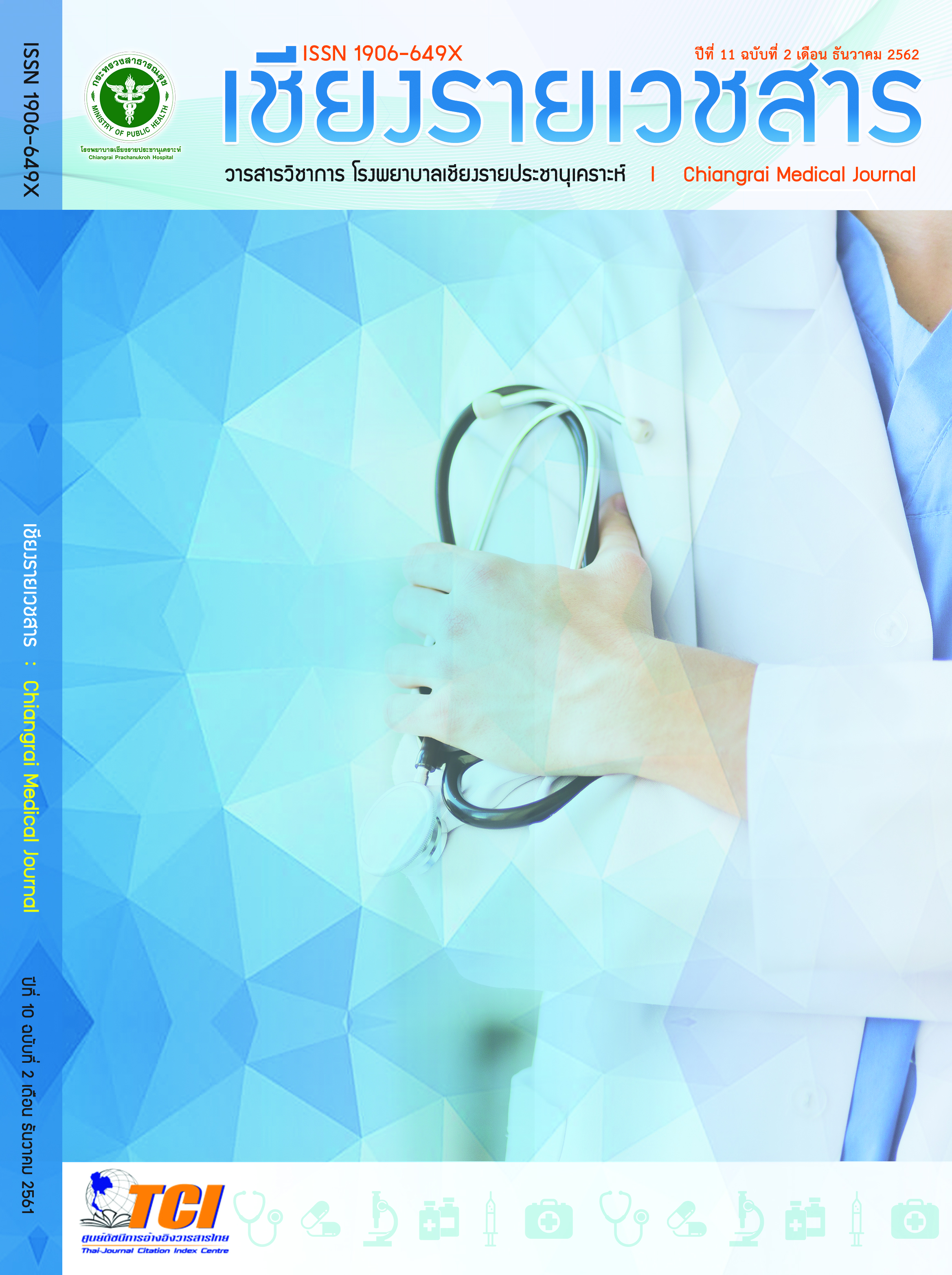EFFECTIVENESS OF PROVIDING HEALTH EDUCATION TO PATIENTS WITH HIGH RISK OF STROKE IN MAE LAO DISTRICT, CHIANG RAI, THAILAND.
Main Article Content
บทคัดย่อ
ประสิทธิผลของการให้ความรู้โดยประยุกต์ใช้แบบแผนความเชื่อด้านสุขภาพต่อการปฏิบัติตัวในผู้ป่วยกลุ่มเสี่ยงโรคหลอดเลือดสมอง อำเภอแม่ลาว จังหวัดเชียงราย
กฤษติพงษ์ ทิพย์ลุ้ย พ.บ , ปุณญณิน เขื่อนเพ็ชร์ พย.ม
บทคัดย่อ
ความเป็นมา ผู้ป่วยโรคหลอดเลือดสมองอำเภอแม่ลาว จังหวัดเชียงราย พบมากในผู้ป่วยโรคเบาหวานและความดันโลหิตสูง ร้อยละ 38.46 ,46.00 ตามลำดับ ส่งผลกระทบต่อผู้ป่วยทั้งทางด้านร่างกาย จิตใจ เศรษฐกิจ และสังคม การให้ความรู้เพื่อให้กลุ่มเสี่ยงมีพฤติกรรมสุขภาพที่ถูกต้องเป็นสิ่งสำคัญในการป้องกันโรคหลอดเลือดสมอง
วัตถุประสงค์ เพื่อศึกษาประสิทธิผลของการให้ความรู้โดยประยุกต์ใช้แบบแผนความเชื่อด้านสุขภาพต่อการปฏิบัติตัวในผู้ป่วยกลุ่มเสี่ยงโรคหลอดเลือดสมอง อำเภอแม่ลาว จังหวัดเชียงราย
วิธีการศึกษา วิจัยกึ่งทดลอง (Quasi-experimental Research) แบบ One-group intervention study วัดผลเปรียบเทียบก่อนและหลังดำเนินกิจกรรมให้ความรู้โดยประยุกต์ใช้แบบแผนความเชื่อด้านสุขภาพเพื่อป้องกันโรคหลอดเลือดสมองติดตามการศึกษาเป็นเวลา 8 สัปดาห์ คัดเลือกผู้ที่มีปัจจัยเสี่ยงต่อโรคหลอดเลือดสมองที่รับบริการคลินิกโรคไม่ติดต่อเรื้อรังเครือข่ายอำเภอแม่ลาว จำนวน 139 คน เริ่มศึกษา สิงหาคม - ตุลาคม 2560
ผลการศึกษา พบว่า คะแนนเฉลี่ยความรู้เกี่ยวกับโรคหลอดเลือดสมอง การรับรู้โอกาสเสี่ยงต่อการเกิดโรค การรับรู้ความรุนแรงของโรค การรับรู้ประโยชน์ของการปฏิบัติตัวตามคำแนะนำในการป้องกันโรคและการปฏิบัติตัวในการป้องกันโรคหลังดำเนินกิจกรรมมากกว่าก่อนดำเนินกิจกรรมอย่างมีนัยสำคัญทางสถิติ (P<0.001)
สรุปและข้อเสนอแนะ การศึกษาครั้งนี้สามารถนำไปพัฒนาในการส่งเสริมสุขภาพและป้องกันภาวะแทรกซ้อนในผู้ป่วยกลุ่มโรคไม่ติดต่อเรื้อรังอื่นต่อไป
คำสำคัญ โรคหลอดเลือดสมอง, แบบแผนความเชื่อด้านสุขภาพ, ผู้ป่วยกลุ่มเสี่ยงโรคหลอดเลือดสมอง
Effectiveness of providing health education to patients with high risk of stroke in Mae Lao District, Chiang Rai, Thailand.
Krittiphong Thipluis (MD), Punyanin Khuanphet (M.N.S.)
Abstract
BACKGROUND The number of patients suffering from strokes in Mae Lao District, Chiang Rai, found in patients with diabetes mellitus type 2 and hypertension 38.46%, 46.00% respectively. Therefore, providing health education to these groups at risk can ensure these they follow healthier lifestyles to reduce their chances of stroke.
Objective To study Effectiveness of providing health education to patients with high risk of stroke in Mae Lao District, Chiang Rai, Thailand.
Methods This study is a quasi-experimental research comprising a one-group intervention study. This is done by measuring the before and after providing health education to prevent stroke by applying health belief model without any comparison. Follow in 8 weeks. Study in 139 patients, selected by purposive sampling for patients at high risk of stroke who have been treated at the Chronic Non-Communicable Clinic in Mae Lao Hospital and Sub-district health promotion hospital. The study period was between Aug 2017 to Oct 2017.
Results From the study, the average scores of knowledge about stroke, perception of the risk of disease, perception of disease severity, perception of practice’s benefits according to instructions for preventing stroke, and practice to prevent stroke after the activities were all higher than before the activities with a statistically significant difference (P<0.001)
CONCLUSION AND DISCUSSION This study can be developed to promote health and prevent complications in other chronic non-communicable disease patients.
Key words Stroke, Health Belief Model, Patients at High Risk for Stroke
Article Details
เอกสารอ้างอิง
1. วารสารสมาคมโรคหลอดเลือดสมองไทย. วันโรคหลอดเลือดสมองโลก. 2019 (เข้าถึงเมื่อ 1 มี.ค. 2560) เข้าถึงได้จาก: https://thaistrokesociety.org
2. สำนักโรคไม่ติดต่อ. จำนวนและอัตราตายด้วยโรคไม่ติดต่อและการบาดเจ็บประจำปีปฏิทิน พ.ศ. 2558. นนทบุรี : ชุมนุมสหกรณ์การเกษตรแห่งประเทศไทย จำกัด. 2559 (เข้าถึงเมื่อ 12 มี.ค. 2560). เข้าถึงได้จาก https://thaincd.com/information-statistic/non-communicable-disease-data.php
3. งานเวชระเบียนและสถิติโรงพยาบาลแม่ลาว. ข้อมูลผู้ป่วยโรคหลอดเลือดสมองที่มารับบริการในโรงพยาบาลแม่ลาว จังหวัดเชียงราย. 2559
4. สุวิตรา สร้างนาวัลยา. ประสิทธิผลของโปรแกรมสุขศึกษาโดยประยุกต์ใช้แบบแผนความเชื่อด้านสุขภาพร่วมกับการเสริมสร้างพลังอำนาจในการปรับเปลี่ยนพฤติกรรมสุขภาพเพื่อป้องกันโรคหลอดเลือดสมองของผู้ป่วยโรคความดันโลหิตสูง ในอำเภอเมือง จังหวัดชัยภูมิ. วิทยานิพนธ์ปริญญาสาธารณสุขศาสตรมหาบัณฑิต. มหาวิทยาลัยขอนแก่น. 2557
5. Becker MH. The health belief model and personal health behavior. New Jersey: Charles slack. 1974
(เข้าถึงเมื่อ 12 มี.ค. 2560). เข้าถึงได้จาก https://www.tci-thaijo.org
6. ทักษพล ธรรมรังสี. รายงานสถานการณ์โรค NCDs วิกฤตสุขภาพ วิกฤตสังคม. นนทบุรี : สำนักวิจัยนโยบายสร้างเสริมสุขภาพ. 2557


